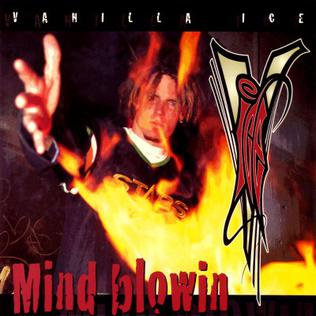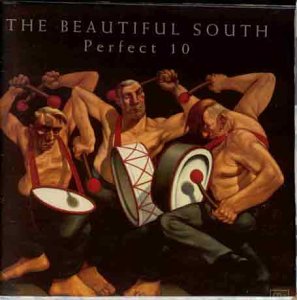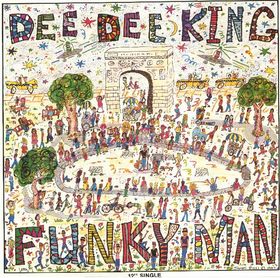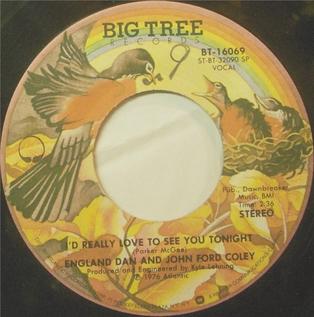Funky Man may refer to:
Funky Man may refer to:

Douglas Glenn Colvin, better known by his stage name Dee Dee Ramone, was an American musician. He was the bassist and a founding member of the punk rock band Ramones. Throughout the band's existence, he was the most prolific lyricist and composer, writing many of their best-known songs, such as "53rd & 3rd", "Chinese Rock", "Commando", "Wart Hog", "Rockaway Beach", "Poison Heart" and "Bonzo Goes To Bitburg". The latter won the New York Music Award for best independent single of the year in 1986, while Animal Boy, which the song is from, won for best album.

Teren Delvon Jones, better known by his stage name Del the Funky Homosapien or Sir DZL, is an American rapper.

Mind Blowin' is the second studio album by American rapper Vanilla Ice. Released on March 22, 1994, it is the rapper's final release on SBK Records. The album did not chart, and received unfavorable reviews. It has since received some degree of cult status in the hip hop community. Songs from the album made up one third of Vanilla Ice's tours during 1992–2010. The album shifted just 42,000 copies in the United States, a massive drop in comparison to his blockbuster debut album To the Extreme. Despite this, lead single "Roll 'Em Up" received some airplay in Europe.
Nasty may refer to:
Audio Two was the Brooklyn, New York hip hop duo of emcee Kirk "Milk Dee" Robinson and DJ Nat "Gizmo" Robinson, most famous for its first hit "Top Billin'".

"Born to Raise Hell" is a song by the British rock band Motörhead. Originally written by Lemmy Kilmister for the German band Skew Siskin, it plays over the opening credits of the 1994 film Airheads in which Lemmy makes a cameo appearance.

The Spencer Davis Group were a British band formed in Birmingham in 1963 by Spencer Davis (guitar), brothers Steve Winwood and Muff Winwood, and Pete York (drums). Their best known songs include the UK number ones "Somebody Help Me" and "Keep on Running", "I'm a Man" and "Gimme Some Lovin'", which reached #2 in the UK and #7 in the US.

Diana Ross & the Supremes Join the Temptations is, as the title implies, a collaborative album combining Motown's two best selling groups, Diana Ross & the Supremes and the Temptations. Issued by Motown in late 1968 to coincide with the broadcast of the Supremes/Temptations TCB television special, the album was a success, reaching #2 on the Billboard 200. Diana Ross & the Supremes Join the Temptations spent four weeks at number one on the UK Albums Chart.

"Perfect 10" is a song by English pop rock band the Beautiful South, released on 21 September 1998 as the first single from their sixth studio album, Quench (1998). It debuted at number two on the UK Singles Chart, selling 89,000 copies during its first week of release, and is the band's last UK top-10 single to date. It received a platinum certification from the British Phonographic Industry in 2021 for sales and streams exceeding 600,000 units.

"Too Funky" is a song written and performed by English singer and songwriter George Michael and released by Columbia Records in the United States and Epic Records elsewhere in 1992. The song was Michael's final single for his recording contract with Sony Music before he started legal action to extricate himself from it.
"Fascination" is a song written by English singer-songwriter David Bowie and American musician Luther Vandross for Bowie's Young Americans album in 1975. The song originated from a Vandross song called "Funky Music " which The Mike Garson Band used to play before Bowie concerts in 1974.

"Funky Cold Medina" is a hip hop song written by Young MC, Matt Dike and Michael Ross, and first performed by American rapper, actor and producer Tone Lōc. It was the second single from Lōc's debut album, Lōc-ed After Dark (1989). The single was released on March 18, 1989, and rose to number three on the Billboard Hot 100 the following month where it went platinum, selling over one million copies and becoming the second ever platinum-certified rap single. It peaked on the UK Singles Chart at number 13 in May of that year.

Knowledge Is King is the third solo studio album by American rapper Kool Moe Dee, released on May 30, 1989, via Jive Records.

Funke, Funke Wisdom is the fourth solo studio album by American recording artist Kool Moe Dee from the Treacherous Three. It was released in 1991 via Jive Records, making it the rapper's final album on the label.

Standing in the Spotlight is the first solo studio album by Dee Dee Ramone released in 1989, under the rap moniker Dee Dee King. The album is sometimes considered to be one of the biggest failures in recording history.

"Funky Man" is a single by Dee Dee King, the rapper alias of Ramones bassist Dee Dee Ramone. It was released as a 12-inch single by Profile Records imprint Rock Hotel Records, with the B-side being an extended dub version of the song. The cover art work was by James Rizzi.

"The Light" is the Grammy-nominated second single from Common's 2000 album Like Water for Chocolate. It was produced by Jay Dee and features keyboards performed by James Poyser. It samples "Open Your Eyes" as performed by Bobby Caldwell and the drums from "You're Gettin' a Little Too Smart" by The Detroit Emeralds. Framed as a love letter, it is a confession of Common's love for a woman – specifically, his girlfriend at the time, Erykah Badu. Cynthia Fuchs of PopMatters describes it as a "charming, tender, and undeniably soulful declaration of affection and respect." The music video features Common, Erykah Badu and "recognizable sensual delights" including "a homemade Minnie Riperton cassette, a mango, a pink lava lamp [and] a deeply green water-beaded leaf."

"I'd Really Love to See You Tonight" is a song written by Parker McGee and recorded by England Dan & John Ford Coley from their 1976 album Nights Are Forever. It eventually peaked at No. 2 on the Billboard Hot 100 chart for two weeks, behind Wild Cherry's "Play That Funky Music" and No. 1 on the Easy Listening chart. Billboard ranked it as the No. 21 song for 1976. It also reached No. 26 on the UK Singles Chart.
UK funky is a genre of electronic dance music born in United Kingdom that is heavily influenced by Soca, soulful house, tribal house, UK garage, broken beat and grime. Typically, UK funky blends beats, bass loops and synths with African and Latin percussion in the dembow rhythm and contemporary R&B-style vocals.

"Funkier Than a Mosquito's Tweeter" is a song written by Alline Bullock, sister of Tina Turner. It was first released by Ike & Tina Turner on their 1970 album Workin' Together with Tina Turner and the Ikettes on vocals. Mosquita's was the original spelling of Mosquito's, but after jazz singer Nina Simone released her version in 1974, most subsequent releases of the song have used the latter spelling including Ike & Tina Turner reissues.